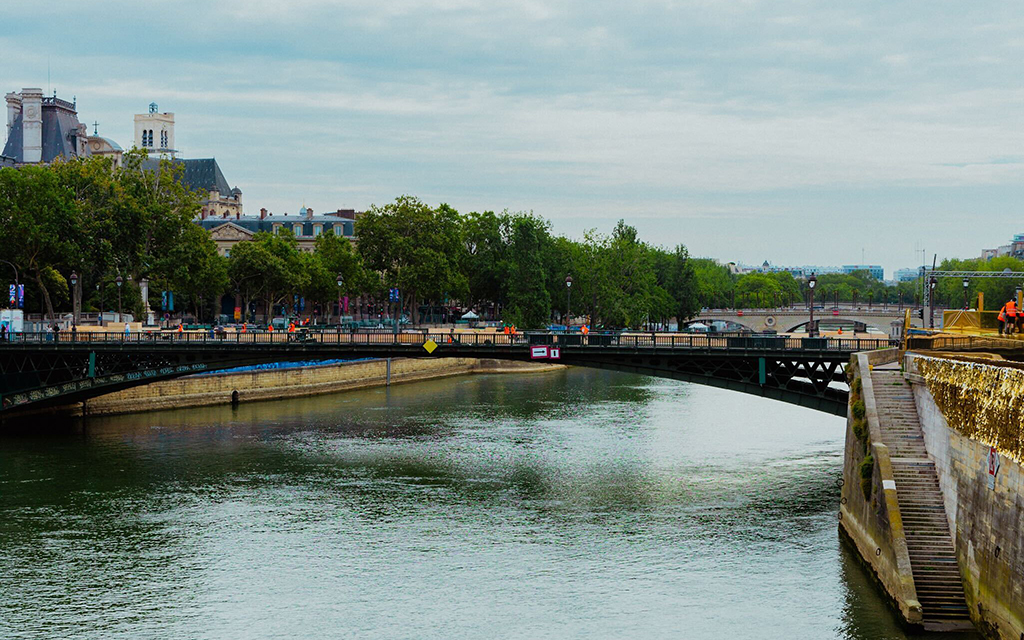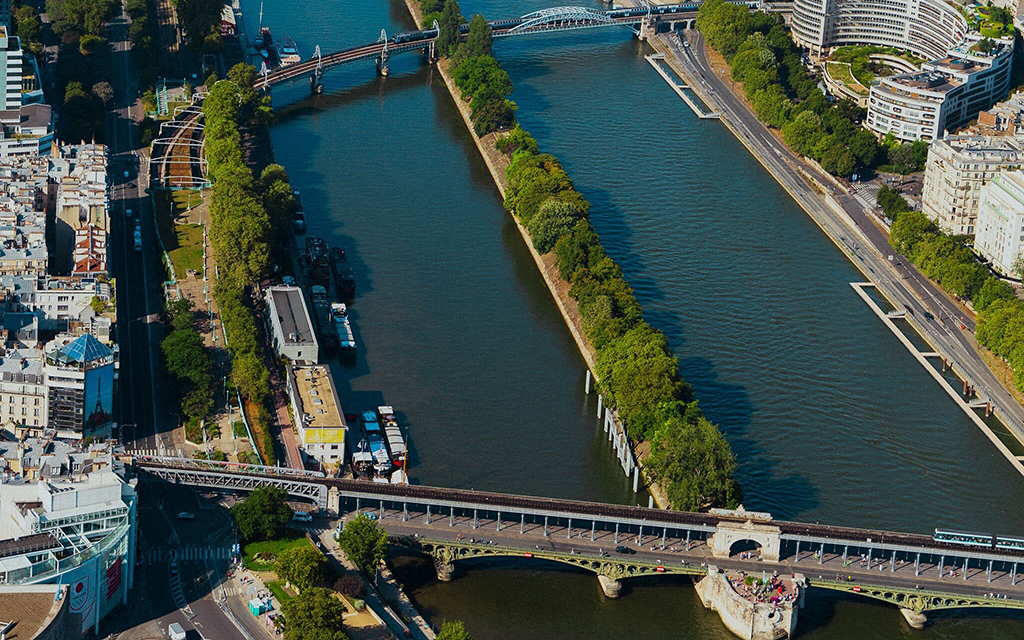
Despite IOC and City of Paris guarantees, the Seine River was found to be unsafe to hold the swimming portion of the men’s triathlon Tuesday. (Photo by Savannah Bowie/Special for Cronkite News)
PARIS – As many expected in the lead up to the Olympic Games, the River Seine has been a major headache for the International Olympic Committee. Its most recent migraine regarding the iconic waterway’s cleanliness has been its biggest, with dangerous levels of contaminants in the water causing the postponement of Tuesday’s Men’s Triathlon Final.
“The conditions weren’t right to put the athletes in the Seine today,” IOC sports director Kit McConnell said. “Of course we try and run everything on schedule, but you’ve heard the reasons why.”
The main factor causing the delay, and the straight cancellation of previous training sessions at the site, was the detection of unsafe readings of the fecal bacteria E. Coli in the River Seine. The results contradicted the goal of the IOC and Paris to make it suitable for water-related events Tuesday, pushing back the men’s triathlon event. Despite a $1.5 billion effort to eliminate sewage and runoff through various methods over the last nine years, as well as a moral assurance from Mayor Anne Hidalgo’s plunge July 17, the risk of athlete sickness didn’t outweigh the reward of starting on time.
“We are all disappointed,” World Triathlon president Marisol Casado said. “We were not able to follow strictly what was planned.”
The choice, while necessary for athlete safety, comes as an embarrassment to the City of Paris and IOC, who couldn’t do enough to make a waterway where public swimming has been illegal for 100 years ready for the caps and cameras. Three out of four water tests conducted since the city experienced substantial rain storms on July 26 and 27 found the river to contain more than 1,000 traces of E. Coli (cfu/100mL), ultimately taking the decision out of the hands of the IOC and World Triathlon.
However, with cautious optimism, executives believe conditions will allow for both the women’s and men’s triathlon events to go Wednesday, thanks to extensive data trends of the water.
“The data fluctuates from one day to another,” said Aurélie Merle, executive director of Sports for Paris 2024. “From the results, we’re very close to the threshold for the triathlon. We have data on the River Seine for one year, so we can assess the evolution.”

The postponement of the men’s triathlon caused frustration among many executives. “We are all disappointed,” World Triathlon president Marisol Casado said. “We were not able to follow strictly what was planned.” (Photo by Savannah Bowie/Special for Cronkite News)
Officials suggested water quality levels were headed in the right direction as the days wound down, but copious amounts of rain during last week’s opening ceremony increased runoff from sewers, providing a sundown setback.
“The equivalent of usual rainfall in July fell in just 36 hours,” Merle said.
Such disastrous weather conditions undid months of what many saw as real, unprecedented progress in the effort.
“There had been significant improvements regarding the Seine,” McConnell said. “We can’t control the weather. The weather did have a significant impact, and had been a source of the readings we had today. In the buildup period, we had a number of days with excellent conditions.
Should the organizers be given the green light by water tests scheduled for the early morning hours Wednesday, the women’s triathlon will go on as scheduled at 8 a.m. local time, while the men’s event will take place soon after at 10:45. If results remain inadequate, organizers have contingency plans in place to proceed with the postponed men’s triathlon and women’s triathlon events Friday.
While there is universal confidence in Wednesday’s plan, The Weather Channel forecasts possible thunderstorms in the Paris metro area throughout the night starting from 6 p.m. As Mother Nature spoiled Paris’ plans with its weekend downpour, the possibility of another regression in water quality overnight cannot be disregarded. In addition to further postponements, officials suggested eliminating the swim portion of the event, thus creating a “duathlon,” which has not been ruled out as an option.
The swim portion of the original triathlon course stretches 1,500 meters down the Seine, providing ample area and time for exposure to bacteria for competing athletes. Not only slated to host the triathlon events, but the marathon swimming event is also slated to take place in a 10-kilometer portion of the Seine.
Not only is the IOC heavily inconvenienced by the holdup, but athletes and fans alike are also left with more questions than answers. With such uncertainty present, training schedules, routines, flight arrivals and departure times are now all at the behest of Mother Nature, who has run only on her own time for as long as the Seine has flowed.
“We are hopeful we can organize the two competition events tomorrow,” Merle reassured. “It’s taken time for the river to go back to normal, but in the past weeks we’ve been extremely confident. We’ve seen how quickly, despite the rainfall we had in July, the Seine could recover.”